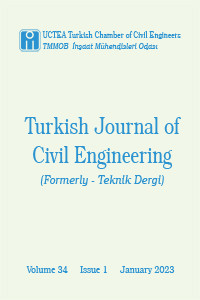Geri Dönüştürülmüş Atık Polipropilenin Bitümlü Bağlayıcılarda Kullanılması
Bitüm, geri dönüştürülmüş polipropilen, gamma ışıması, modifikasyon
Usage of Recycled Postconsumer Polypropylene in Bituminous Binder
Bitumen, recycled polypropylene, gamma irradiation, modification,
___
- Read, J., ve Whiteoak, D., The Shell Bitumen Handbook (5th ed). Thomas Telford, London, UK., 2003.
- Gershkoff, D. R., Carswell, J., Nicholls, J. C., Rheological Properties of Polymer-Modified Binders for Use in Rolled Asphalt Wearing Course. Crowthorne: Transport Research Laboratory, Thomas Telford, London, UK., 1999.
- Isacsson, U., Lu, X. H., Laboratory Investigation of Polymer Modified Bitumens”, Journal of the Association of Asphalt Paving Technology, Cilt 68, 35-63, 1999.
- Perez-Lepe, A., Martinez-Boza, F. J., Gallegos, C., Gonzalez, O., Munoz, M. E., ve Santamaria, A., Influence of the Processing Conditions on the Rheological Behaviour of Polymer-modified Bitumen, Fuel, Cilt 82, No 11, 1339-1348, 2003.
- Airey, G. D., Rheological Evaluation of Ethylene Vinyl Acetate Polymer Modified Bitumens, Construction and Building Materials, Cilt 16 No 8, 473-487, 2002.
- Lu, X., Isacsson, U., Rheological Characterization of Styrene-Butadiene-Styrene Copolymer Modified Bitumens, Construction and Building Materials, Cilt 11, No 1, 23-32, 1997.
- Ahmedzade, P., The investigation and comparison effects of SBS and SBS with new reactive terpolymer on the rheological properties of bitumen, Construction and Building Materials, Cilt 38, Ocak, 285-29, 2013.
- Nekhoroshev V.P., Nekhorosheva A.V., Popov E.A., Gossen L.P., Influence of the Products of Chemical Modification of Atactic Polypropylene on Properties of Bitumen Binders, Russ. J. Appl. Chem., 74(8), 1368-1373, 2001,.
- Morrison G.R., Lee J.K., Hesp S.A.M., Chlorinated Polyolefins for Asphalt Binder Modification, Applied Polymer Science, 54, 231–240, 1994.
- Yousefi A.A., Polyethylene Dispersions in Bitumen: The Effects of the Polymer Structural Parameters, Applied Polymer Science, 90, 3183-3190, 2003.
- Ai A., Yi-Qiu T., Long-Term Aging of Polypropylene Asphalt Paving Mixtures 26th Annual Southern African Transport Conference, 7, 761-767, 2007.
- Garcia-Morales, M., Partal, P., Navarro, F. J., Martinez-Boza, F., Mackley, M. R., ve Gallegos, C., The Rheology of Recycled EVA/LDPE Modified Bitumen, Rheologica Acta, Cilt 43, No 5, 482-490, 2004.
- Gad, Y. H., Magida, M. M. ve El-Nahas, H. H., Effect of Ionizing Irradiation on the Thermal Blend of Waste Low Density Polyethylene/Ethylene Vinyl Acetate/Bitumen for Some Industrial Applications, Journal of Industrial and Engineering Chemistry, Cilt 16 No 6, 1019-1024, 2010.
- Fintzou, A. T., Kontominas M.G., Badeka, A.V., Stahl M. R, Riganakos K. A, Effect Of Electron-Beam And Gamma-Irradiation on Physicochemical And Mechanical Properties of Polypropylene Syringes as a Function of Irradiation Dose: Study Under Vacuum, Radiation Physics and Chemistry, Cilt 76 No 7, 1147-1155, 2007.
- Craver, C.,D., Desk Book of Infrared Spectra, Coblentz Society, Kirkwood, Mo., 1977.
- Colthup N.B., Daly L.H., Wiberley S.G., Introduction to Infrared and Raman Spectroscopy, 2nd ed., Academic Press, New York, 1975.
- ASTM D2872-12e1 Standard Test Method for Effect of Heat and Air on a Moving Film of Asphalt (Rolling Thin-Film Oven Test)
- ASTM D6521-08 Standard Practice for Accelerated Aging of Asphalt Binder Using a Pressurized Aging Vessel (PAV)
- Bahia, H.U., Anderson, D.A., Strategic Highway Research Program Binder Rheological Parameters: Background and Comparison with Conventional Properties, Transportation Research Record, 1488, TRB, National Research Council, Washington DC, 1995.
- Zaniewski, J.P., Pumphrey, M.E., Evaluation of Performance Graded Asphalt Binder Equipment and Testing Protocol, Asphalt Technology Program, West Virginia University, Morgantown, 2004.
- McGennis, R.B., Shuler, S., Bahia, H.U., Background of Superpave Asphalt Binder Test Methods, National Asphalt Training Center Demonstration Project 101, Publication No. FHWA-SA-94-069, Asphalt Institute, Lexington, USA 1994.
- ASTM D7175-08 Standard Test Method for Determining the Rheological Properties of Asphalt Binder Using a Dynamic Shear Rheometer.
- Kennedy T.W., Huber G.A., Harrigan E.T., Cominsky R.J., Hughes C.S., Quintus H.V. and Moulthrop J.S., Superior Performing Asphalt Pavements (Superpave): The Product of the SHRP Asphalt Research Program, SHRP-A-410, National Research Council, Washington DC, USA., 1994.
- ASTM D6648-08 Standard Test Method for Determining the Flexural Creep Stiffness of Asphalt Binder Using the Bending Beam Rheometer (BBR)
- Sengoz, B., Giray I., Analysis of styrene-butadiene-styrene polymer modified bitumen using fluorescent microscopy and conventional test methods, Journal of Hazardous Materials 150.2, 424-432, 2008.
- Güngör, A. G., Sağlık, A., Orhan, F., Öztürk, E. A., Polimer Modifiye Bitümlerin Superpave Performans Sınıflarının Belirlenmesi, 5.Ulusal Asfalt Sempozyumu, Ankara, 2009.
- ISSN: 2822-6836
- Yayın Aralığı: 6
- Başlangıç: 1990
- Yayıncı: TMMOB İnşaat Mühendisleri Odası
Geri Dönüştürülmüş Atık Polipropilenin Bitümlü Bağlayıcılarda Kullanılması
Perviz AHMEDZADE, Alexander FAINLEIB, Taylan GÜNAY, Olga GRIGORYEVA
Isparta Bölgesi Yağış Değerlerinin IDW ve Kriging Enterpolasyon Yöntemleri ile Tahmini
E. Dilek TAYLAN, Derya DAMÇAYIRI
İstanbul için Gece Parklanma Davranışları Modellemesi
Global Güneş Radyasyon Tahmini: Gaziantep Uygulaması
Haluk AKGÜN, Mahir ADA, Mustafa Kerem KOÇKAR
Akarsu Köprü Temellerindeki Oyulma Riskinin Değerlendirilmesi
